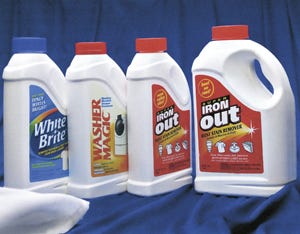Cleaners that help cleanup the environment
January 30, 2014
|
Cleaning products manufacturer Summit Brands, Fort Wayne, IN, is making its packaging more environmentally friendly by incorporating 25 percent post-consumer recycled content (PCR) into the high density polyethylene (HDPE) resin used to manufacture the bottles and jugs for its specialty household cleaning and laundry products.
With brands such as Super Iron Out, Instant Rust Out and Dishwasher Magic, Summit worked with Silgan Plastics (www.silganplastics.com) and packaging provider TricorBraun (www.tricorbraun.com) on the project.
Summit has long been environmentally conscious, says Dan Teague, a TricorBraun packaging consultant who sourced the bottles with Silgan Plastics. “Summit began lightweighting its bottles in the early 1990s.”
The use of PCR plastic has grown in recent years, driven by the requirements of California laws that require either the lightweighting of plastic bottles by 10 percent or the use of PCR (Summit chooses to do both), by other states as well as the development of Wal-Mart's Scorecard. Some sources report that this has led to the demand exceeding the current supply of PCR, making PCR sometimes difficult to obtain for smaller manufacturers. Silgan Plastics, as a major user of the regrind resin, says it has not had that problem.
“The best results,” explains Todd Wright, Silgan Plastics' manager of business development, “require a reliable supplier of the resin and experience in using it. Bottles can vary from batch to batch, as PCR is combined with virgin resin unless the process is carefully monitored.
“We have used PCR in bottles for our customers for more than fifteen years at levels between twenty-five percent and 100 percent, and we can testify to the importance of a trusted supplier and an experienced production crew,” Wright says.
PCR becoming a given?
Today in the household products category, Wright adds, it's virtually a given that PCR will be used in bottles. “This increase in demand across the industry may lead to a temporary shortage,” he says, “but that should lead in turn to a corresponding increase of sources of supply.”
Along with asking TricorBraun and Silgan to make its bottles as light as possible, and to introduce the PCR content in its new packaging, Summit management has also reduced the volume of its packaging material in another way by replacing its original 16-oz bottle with a 30-oz version and introducing a larger, 80-oz size. This reduces the amount of plastic per ounce of product, and gives consumers an option to buy in bulk instead of in multiples, minimizing overall packaging volume.
TricorBraun's design group, TricorBraun Design & Eng., tweaked the original bottle design to showcase Summit's proprietary pressure-sensitive labels, and it also made the molds used to extrusion/blow-mold the bottles. Silgan Plastics' Ottawa, OH, facility produces the HDPE bottles, which are topped with continuous-threaded closures from Rexam Closures (www.rexamclosures.com).
More information is available: |
Silgan Plastics Corp.,800/274-5426. www.silganplastics.com. |
Rexam Closures, 812/867-6671. www.rexamclosures.com. |
TricorBraun, 800/325-7782. www.tricorbraun.com. |
You May Also Like



